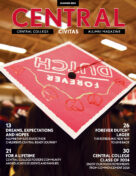 Not many kids can say they have a real interest in politics. Jim Zaffiro could have made that claim with a straight face. After all, his 7-year-old self trick-or-treated through his Milwaukee neighborhood in a JFK costume.
Not many kids can say they have a real interest in politics. Jim Zaffiro could have made that claim with a straight face. After all, his 7-year-old self trick-or-treated through his Milwaukee neighborhood in a JFK costume.
That passion helped inspire a 28-year (and counting) career at Central. Originally specializing in African studies, he came to campus to teach comparative politics. Since then, he has created and taught courses in the four major subfields of political science, along with history, international studies and environmental studies. And he has helped to ignite Central’s commitment to sustainability. All the while, his focus has remained firmly fixed on his students.
“I like making students think in new ways and examine their existing assumptions,” Zaffiro says. “They see how their political and personal values overlap, and I can watch their intellectual growth over time.”
Though Zaffiro is a well-respected Africanist—his work has generated two books and 34 articles—his professional focus has shifted away from research. He prefers projects that more directly impact those around him. “I now refer to myself as a recovering academic,” he jokes. “Early in my career, I was very focused on research, but my priorities and values changed. I once spent a year researching and writing a book on mass media in Botswana, but now I look back and say ‘So what?’” Today, teaching is primary for Zaffiro.
The result is a group of former and current students who credit him with shaping their academic experience. Shannan Mattiace ’90, Ph.D., professor of political science at Allegheny College, is a member of that group. “He was a major part of my intellectual development,” Mattiace says. “He was so steady in his purpose to systematically explore topics. I think I responded to his care and determination to educate.”
Mattiace counts the course World Food Issues: Agriculture, Population and the Environment—which was team-taught by Zaffiro and his wife Louise, professor emerita of chemistry—among the most formative of her education. It influenced her so much that she became a Mexicanist.
The class was a formative one for Zaffiro, too. Studying global food and agriculture helped ignite his passion for environmental studies and global sustainability.
That has become the defining cause of his professional career. Zaffiro has been one of the most influential figures in Central’s now well-recognized sustainability efforts. For him, the cause includes not only ecological integrity, but also social justice and economic equity.
In 1992, Zaffiro helped introduce an interdisciplinary environmental studies major, making Central just the second college in Iowa with a similar program. He now teaches two interdisciplinary courses focusing on sustainability, and he helped to make a global sustainability course a graduation requirement.
Outside the classroom, Zaffiro was appointed to former President David Roe’s first environmental task force in 2000, a group that recommended making a remodeled Vermeer Science Center the first Leadership in Environmental and Energy Design (LEED)-rated building in Iowa. McKee Hall and the Roe Center have since received LEED ratings, too.
He is also co-coordinator—with Mike Lubberden, director of facilities planning and management—of SUSTAIN, the Campus Sustainability Working Group, which includes employees, students, alums and community partners. The group designs and implements projects and makes recommendations for ways Central can become more sustainable. Thanks to SUSTAIN’s efforts, sustainability has become a key part of the Central ethos.
“These commitments are worth a lot for the future of the institution,” says Zaffiro. “Our biggest challenge as we go forward with these efforts is to get student buy-in. We have to communicate a sense of importance, of relevance.”
Hear Zaffiro talk about Central’s efforts to go green:
Lars Larson, a junior art major, says Zaffiro helped him find his passion for sustainability. Working around busy cross country and track seasons, Larson participates in SUSTAIN and has worked in the college’s organic garden. He also appreciates Zaffiro’s teaching style. “He is not only very knowledgeable but is interested in educating,” Larson says. “I find it interesting when he makes connections with what is going on in the real world.”
Other students note his ability to connect current events to his lectures. With the caucus season in full swing, he is examining how important sustainability will be for the candidates. “I’m afraid that energy and the environment will be invisible in 2012,” Zaffiro says. “This election will be about jobs and the economy. These are such overriding public concerns that people don’t just put environ-mental issues on the back burner—they take them off the stove.”
Still, Zaffiro hopes his students will make themselves heard on Election Day, continuing the trend begun four years ago. “2008 was a special election. It captured the imaginations of young voters, but there is a fear they won’t come back,” Zaffiro says. “I hope students see that political participation in their own country matters.”
The choices his students make at the polls don’t matter to Zaffiro. He only hopes he taught them to reach decisions on their own—and to base them on facts, not mindless media-driven slogans. His students have noticed. “He’s the perfect example of a teacher-scholar,” says Mattiace. “He taught me what it meant to be a scholar but to still love to teach.”
Tell us about a Central professor who touched your life.












To encourage serious, intellectual discourse on Civitas, please include your first and last name when commenting. Anonymous comments will be removed.
Comments are closed.